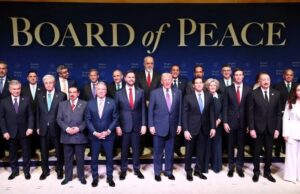Gibraltar Tunnel Project Rekindles Euro-African Ambitions Amid Hope, Hurdles

Tangier, The Gulf Observer: The bustling port city of Tangier is once again at the heart of a grand vision to link Africa and Europe, as Spain and Morocco revive plans for an ambitious undersea tunnel across the Strait of Gibraltar. Long a symbol of cross-continental trade and migration, the Strait may soon become the site of one of the world’s most daring infrastructure projects.
On May 10, Spain committed €1.6 million to updated feasibility studies for a 42-kilometre underwater rail tunnel connecting Punta Paloma in Cadiz to Punta Malabata near Tangier. The initiative, first proposed in the 1980s, is gaining fresh momentum following its formal revival in 2023, after pandemic-era delays.
The tunnel, reaching depths of up to 475 meters beneath the sea, would traverse a seismically active zone near the Azores-Gibraltar fault line—posing enormous engineering challenges. Yet, leaders from both countries remain committed to the project, emphasizing its geostrategic, economic, and symbolic value.
“This is not just a tunnel. It’s a bridge between continents, cultures, and futures,” said Spanish Transport Minister Óscar Puente, in a joint statement with Moroccan authorities.
Political Symbolism and Strategic Timing
The proposed tunnel comes at a time when Morocco is bolstering its international profile, especially as co-host of the 2030 FIFA World Cup alongside Spain and Portugal. Although early hopes tied tunnel completion to the tournament, realistic estimates now target 2040.
Spain’s Foreign Minister José Manuel Albares recently described Morocco as a “strategic partner,” reinforcing bilateral cooperation as central to Europe’s external relations.
This symbolic spirit is further embodied in Operation Crossing the Strait (OPE)—a logistical and diplomatic exercise lauded by Spain’s Ministry of Home Affairs as a model of technical coordination and neighborly cooperation.
Economic Transformation and Ferry Expansion
Economically, the tunnel holds the potential to revolutionize regional logistics and EU-Africa trade, aligning with the European Green Deal and continental supply chain diversification. Analysts at CAPMAD suggest that the project may anchor Morocco as a northern African gateway for European commerce, workforce mobility, and infrastructure development.
This vision is already mirrored in expanding ferry services. In May 2025, ferry operator Balearia launched new high-speed connections between Tarifa and Tangier, highlighting sustained demand for cross-Strait travel.
“It’s a vital route for our customers, for Moroccans, and for all tourists visiting Morocco, particularly Tangier,” a Balearia spokesperson told Morocco World News.
The tunnel would supplement—not replace—ferry traffic, offering a permanent, weather-resistant alternative to existing maritime connections.
Environmental and Technical Caution
However, the project is not without its critics. Environmentalists warn of risks to the Strait’s delicate marine ecosystems, especially in a region that connects the Mediterranean Sea and Atlantic Ocean and serves as a biodiversity hotspot.
There is also public skepticism, driven by a history of political delays, missed deadlines, and shifting priorities. Although studies and diplomatic dialogue continue, physical progress remains elusive. Experts note that the tunnel’s complexity would exceed that of both the Channel Tunnel (Eurotunnel) and Norway’s Ryfast, largely due to seismic hazards and extreme depth.
The Human Element
Beyond engineering and diplomacy, the tunnel embodies a deeply human aspiration. For families split across continents, migrant workers, students, and tourists, the tunnel could offer easier, faster, and safer mobility—a realisation of long-held dreams of integration and opportunity.
But whether the tunnel becomes a gateway of unity or a monument to stalled ambition will depend on sustained political will, funding, and regional collaboration.
As groundwork advances and environmental studies begin, a fundamental question lingers:
Will the Gibraltar tunnel close old divides or reveal new ones?
For now, it remains a vision in progress—but one with profound implications for the future of Euro-African relations.


